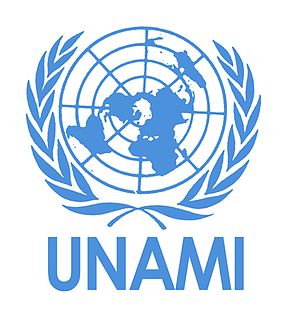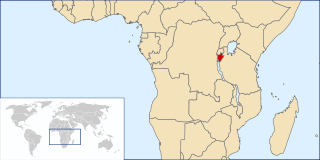
The United Nations Mission in Liberia (UNMIL) was a peacekeeping operation established in September 2003 to monitor a ceasefire agreement in Liberia following the resignation of President Charles Taylor and the conclusion of the Second Liberian Civil War (1999–2003). At its peak it consisted of up to 15,000 U.N. military personnel and 1,115 police officers, along with civilian political advisors and aid workers.

The United Nations Peacebuilding Commission (PBC) is a United Nations intergovernmental advisory body of both the General Assembly and the Security Council that supports peace efforts in conflict affected countries. A key addition to the capacity of the international community in the broad peace agenda, it was established in 2005 with the passage of both A/RES/60/180 and S/RES/1645 Rabab Fatima is the incumbent chair of PBC.

The United Nations Integrated Office in Burundi (BINUB) was established by the United Nations Security Council to support the government of Burundi in its efforts towards long-term peace and stability and to replace the work of United Nations Operation in Burundi (ONUB). Its mandate was scheduled to begin on 1 January 2007 for an initial 12 months, and its creation and mission was as a result of recommendations in a report by the Secretary-General.

The African Union-United Nations Hybrid Operation in Darfur is a joint African Union (AU) and United Nations (UN) peacekeeping mission formally approved by United Nations Security Council Resolution 1769 on 31 July 2007, to bring stability to the war-torn Darfur region of Sudan while peace talks on a final settlement continue.

The United Nations Assistance Mission for Iraq (UNAMI) was formed on 14 August 2003 by United Nations Security Council (UNSC) Resolution 1500 at the request of the Iraqi government to support national development efforts.
Jean Arnault is a French diplomat who currently serves as United Nations Secretary-General António Guterres' Personal Envoy on Afghanistan and Regional Issues.

United Nations Security Council Resolution 1917, adopted unanimously on March 22, 2010, after recalling its previous resolutions on Afghanistan, in particular resolutions 1868 (2009), 1662 (2006) and 1659 (2006), the Council extended the mandate of the United Nations Assistance Mission in Afghanistan (UNAMA) until March 23, 2011 and realigned its mandate to assist with government-led recovery efforts.

United Nations Security Council Resolution 1545, adopted unanimously on 21 May 2004, after recalling all resolutions on the situation in Burundi, particularly Resolution 1375 (2001), the council established the United Nations Operation in Burundi (ONUB) to bring about peace and national reconciliation in the country.

United Nations Security Council resolution 1577, adopted unanimously on 1 December 2004, after recalling Resolution 1545 (2004) on the situation in Burundi, the Council extended the mandate of the United Nations Operation in Burundi (ONUB) for a period of six months until 1 June 2005.

United Nations Security Council resolution 1580, adopted unanimously on 22 December 2004, after reaffirming resolutions 1216 (1998) and 1233 (1999) on the situation in Guinea-Bissau, the Council extended the mandate of the United Nations Peacebuilding Support Office in Guinea-Bissau (UNOGBIS) for a further period of one year and revised its operations. It was the final Security Council resolution adopted in 2004.

United Nations Security Council Resolution 1959, adopted unanimously on December 16, 2010, after recalling resolutions 1719 (2006), 1791 (2007), 1858 (2008) and 1902 (2009), the Council established the United Nations Office in Burundi (BNUB) to replace the United Nations Integrated Office in Burundi (BINUB) as part of a scaled-down United Nations presence in the country for an initial period of twelve months, beginning January 1, 2011.

United Nations Security Council Resolution 1964, adopted unanimously on December 22, 2010, after recalling previous resolutions on the situation in Somalia, the Council authorised the continuation of the mandate of the African Union Mission to Somalia (AMISOM) until September 30, 2011, and increased its size from 8,000 to 12,000 personnel.

United Nations Security Council resolution 1602, adopted unanimously on 31 May 2005, after recalling resolutions 1545 (2004), 1565 (2004), 1577 (2004) and 1596 (2005) on the situation in Burundi, the Council extended the mandate of the United Nations Operation in Burundi (ONUB) for a period of six months until 1 December 2005.

United Nations Security Council Resolution 1974, adopted unanimously on March 22, 2011, after recalling previous resolutions on Afghanistan, in particular 1917 (2010), the Council extended the mandate of the United Nations Assistance Mission in Afghanistan (UNAMA) for a period of one year until March 23, 2012.

United Nations Security Council Resolution 1650, adopted unanimously on 21 December 2005, after recalling Resolution 1545 (2004) regarding the situation in Burundi, the Council extended the mandate of the United Nations Operation in Burundi (ONUB) until 1 July 2006.

United Nations Security Council Resolution 1692, adopted unanimously on June 30, 2006, after recalling resolutions on the situation in Burundi and the African Great Lakes region, particularly resolutions 1650 (2005) and 1669 (2006), the Council extended the mandate of the United Nations Operation in Burundi (ONUB) until December 31, 2006.

United Nations Security Council Resolution 1702, adopted unanimously on August 15, 2006, after recalling resolutions 1542 (2004), 1576 (2004), 1608 (2005) and 1658 (2006) on the situation in Haiti, the Council extended the mandate of the United Nations Stabilisation Mission in Haiti (MINUSTAH) until February 15, 2007.

United Nations Security Council Resolution 1734, adopted unanimously on December 22, 2006, after recalling all previous resolutions on the situation in Sierra Leone, including resolutions 1620 (2005) and 1688 (2006), the Council renewed the mandate of the United Nations Integrated Office in Sierra Leone (UNIOSIL) until December 31, 2007.

The United Nations Support Mission in Libya (UNSMIL) is a United Nations (UN) advanced mission in Libya, created in the aftermath of the Libyan Civil War. UNSMIL is a political mission, not a military mission. The main elements of its mandate defined by the UN include supporting Libyan transitional authorities in "post-conflict efforts", providing mediation in implementing Libyan political agreements, supporting key Libyan institutions and monitoring and reporting on human rights. UNSMIL is led by the UN Department of Political Affairs.

The Office of the Special Representative of the Secretary-General on Sexual Violence in Conflict (OSRSG-SVC) is an office of the United Nations Secretariat tasked with serving the United Nations' spokesperson and political advocate on conflict-related sexual violence, the Special Representative of the Secretary-General on Sexual Violence in Conflict (SRSG-SVC). The Special Representative holds the rank of Under-Secretary-General of the United Nations and chairs the UN Action Against Sexual Violence in Conflict. The mandate of the SRSG-SVC was established by Security Council Resolution 1888, introduced by Hillary Clinton, and the first Special Representative, Margot Wallström, took office in 2010. The current Special Representative is Pramila Patten of Mauritius, who was appointed by United Nations Secretary General António Guterres in April 2017. The work of the SRSG-SVC is supported by the United Nations Team of Experts on the Rule of Law/Sexual Violence in Conflict, co-led by the Department of Peacekeeping Operations (DPO), Office of the High Commissioner for Human Rights (OHCHR) and the United Nations Development Programme (UNDP), also established under Security Council Resolution 1888.















